Crossway Andreas J. Köstenberger Collection (5 vols.)
Digital Logos Edition
Overview
The Crossway Andreas J. Köstenberger Collection brings together the research of several influential evangelical scholars addressing issues related to both the church and to academia. Köstenberger is a highly respected scholar, a prolific author, and an exceptional communicator. His work as the editor of the Journal of the Evangelical Theological Society, as well as his own writings, have kept him at the forefront of evangelical theology for the past several years. Within this collection, you’ll find resources to equip you to engage in serious theological discussion on issues ranging from marriage and family to Bart Ehrman’s attacks on orthodox Christianity. Current in its treatment of these and other theological issues, the works in this collection set recent research within the context of historical evangelicalism by discussing in depth the past, present, and future of evangelical theology.

Key Features
- Explores key debates in biblical studies, culture, and apologetics
- Includes up-to-date research on biblical teaching and the family
- Argues for the authenticity and authority of the Bible
Product Details
- Title: Crossway Andreas J. Köstenberger Collection
- Publisher: Crossway
- Volumes: 5
- Pages: 1,392
- Christian Group: Baptist
- Topic: Apologetics, Biblical Studies, Theology
Individual Titles
- Excellence: The Character of God and the Pursuit of Scholarly Virtue by Andreas J. Köstenberger
- The Final Days of Jesus: The Most Important Week of the Most Important Person Who Ever Lived by Andreas J. Köstenberger, Justin Taylor, and with Alexander Stewart
- God, Marriage, and Family: Rebuilding the Biblical Foundation by Andreas J. Köstenberger and David W. Jones
- The Heresy of Orthodoxy: How Contemporary Culture’s Fascination with Diversity Has Reshaped Our Understanding of Early Christianity by Andreas J. Köstenberger and Michael J. Kruger
- Quo Vadis, Evangelicalism?: Perspectives on the Past, Direction for the Future: Nine Presidential Addresses from the First Fifty Years of the Journal of the Evangelical Theological Society edited by Andreas J. Köstenberger
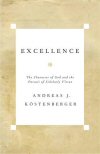
Quo vadis?–Where are you going?-is an appropriate question to ask of the current evangelical movement. To get a bearing on evangelical thought and assess future directions, the editor of the Journal of the Evangelical Theological Society, Andreas J. Köstenberger, has gathered selected addresses from past presidents of the ETS and contributed a thorough introduction and probing epilogue of his own. Covering the early years, the maturing movement, and recent times, the addresses-which span JETS’ first fifty years-include discussions of foundational doctrinal issues, exegetical and theological practice and methodology, and current concerns delivered by some of evangelicalism’s most distinguished leaders.
These presidential addresses give today’s scholars a much fuller and deeper appreciation of the history of evangelicalism and their place within it. Readers will also experience great hope for the future of a movement whose best days, by God’s grace, are yet to come.
As one of the few surviving founders and charter members of the Evangelical Theological Society, it gives me great pleasure to recommend Quo Vadis, Evangelicalism? I hope this will help others to understand our stance and help us by the grace of God to fulfill our aims, to the glory of God.
—Roger Nicole, co-founder, Evangelical Theological Society
This is a valuable history. But more than that, it shows just how difficult it is to preserve Christian orthodoxy, constantly beset as it is by questions, challenges, and perplexities. This calls for fidelity and wisdom, and these presidents showed that they had what was needed.
—David F. Wells, distinguished senior research professor, Gordon-Conwell Theological Seminary
John Stott once defined evangelicals as Bible people and gospel people. This anthology of ETS presidential addresses shows how these two lodestars-an unswerving commitment to the totally truthful Word of God written and the transforming message through the living Word of God, Jesus Christ-have guided the evangelical academy for the past half century.
—Timothy George, founding dean, Beeson Divinity School
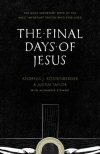
In the last days of his ministry, Jesus entered the city of Jerusalem and boldly predicted that he would soon be put to death—executed on a cross, like a common criminal. So began the most important week of the most important person who ever lived.
Nearly 2,000 years later, the events that took place during Jesus’ last days still reverberate through the ages. Designed as a day-by-day guide to Passion Week, The Final Days of Jesus leads us to re-examine and meditate on the history-making, earth-shaking significance of Jesus’s arrest, trial, crucifixion, and empty tomb.
Combining a chronological arrangement of the Gospel accounts with insightful commentary, charts, and maps, this book will help you better understand what actually happened all those years ago—and why it matters today.
This is a book about the most important person who ever lived during the most crucial week of his life. If you want to get to know the person and teachings of Jesus in the context of an engaging story with practical commentary, this book is for you. It is biblical, personal, and transformational.
—Darrin Patrick, lead pastor, The Journey, St. Louis, Missouri
An enlightening and edifying look at the most important week in history. Both those who want to know more about the history and those who long to behold the wonder will find much to love about this great work. One gets the sense that we should proceed through these pages on our knees.
—J.D. Greear, lead pastor, The Summit Church, Durham, North Carolina
You may be wondering what can be done to make Christ’s last week come alive in ways it hasn’t before. It would help to understand the historical background and cultural script a little better, but you don’t want a big book. It would help, too, if your authors were trustworthy, knowledgeable evangelical scholars who could write clearly for laypeople. Look no further—this is the book for you!
—Craig L. Blomberg, Distinguished Professor of New Testament, Denver Seminary
Justin Taylor is executive vice president of book publishing and book publisher at Crossway. He has authored, edited, or contributed to several books including Beyond the Bounds: Open Theism and the Undermining of Biblical Christianity, Suffering and the Sovereignty of God, and A God Entranced Vision of All Things.
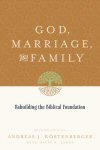
The release of the landmark first edition of God, Marriage, and Family provided an integrated, biblical treatment of God’s purposes for the home. Since then, explain authors Andreas Köstenberger and David Jones, the crisis confronting modern households has only intensified, and yet the solution remains the same: obedience to and application of God’s Word.
In the second edition of God, Marriage, and Family, Köstenberger and Jones explore the latest controversies, cultural shifts, and teachings within both the church and society and further apply Scripture’s timeless principles to contemporary issues. This new edition includes an assessment of the family-integrated church movement; discussion of recent debates on corporal punishment, singleness, homosexuality, and divorce and remarriage; new sections on the theology of sex and the parenting of teens; and updated bibliographies. This book will prove to be a valuable resource for personal and group study, Christian counseling, and marriage and family courses.
In breadth of coverage, thoroughness of learning, clarity of analysis and argument and, I think, soundness of judgment, this solid, lucid, pastorally angled treatise has no peer. Evangelicals who research, debate, teach, and counsel on gender, sex, marriage, and family will find it an endlessly useful resource. The easy mastery with which the author threads his way through forty years’ special pleadings gives this compendium landmark significance, and I recommend it highly.
—J.I. Packer, Board of Governors’ Professor of Theology, Regent College
The special value of this book lies in its pervasive exposition of Scripture. We are adrift in a sea of speculation without this. I am thankful for the book. I plan to give it to my grown children.
—John Piper, founder, desiringGod.org
Anything Andreas Köstenberger publishes is worthy of attention. His international education and experience, his teaching career, and his Christian character make him an author to be read with both care and anticipation. You may not agree with all his conclusions, but you’ll be better equipped for living and teaching about God, marriage, and Family. Sensible, balanced, and biblical, this is a sound and timely summary of the Bible’s teaching on some of the most basic and yet controversial topics in today’s world. I highly recommend it.
—Mark Dever, senior pastor, Capitol Hill Baptist Church, Washington DC
David W. Jones serves as associate professor of Christian ethics and coordinator of Th.M. and thesis studies at Southeastern Baptist Theological Seminary. He is the author of Reforming the Morality of Usury. Dr. Jones has also authored more than a dozen articles that have appeared in various academic publications and is a frequent speaker at churches, ministries, and Christian conferences. Dr. Jones currently resides in the Raleigh/Durham area of North Carolina with his wife and four children.
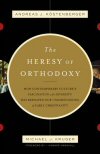
Beginning with Walter Bauer in 1934, the denial of clear orthodoxy in early Christianity has shaped and largely defined modern New Testament criticism, recently given new life through the work of spokesmen like Bart Ehrman. Spreading from academia into mainstream media, the suggestion that diversity of doctrine in the early church led to many competing orthodoxies is indicative of today’s postmodern relativism. Scholars Köstenberger and Kruger engage Ehrman and others in this polemic against a dogged adherence to popular ideals of diversity.
Köstenberger and Kruger’s accessible and careful scholarship not only counters the “Bauer Thesis” using its own terms, but also engages overlooked evidence from the New Testament. Their conclusions are drawn from analysis of the evidence of unity in the New Testament, the formation and closing of the canon, and the methodology and integrity of the recording and distribution of religious texts within the early church.
In the beginning was Diversity. And the Diversity was with God, and the Diversity was God. Without Diversity was nothing made that was made. And it came to pass that nasty old ’orthodox’ people narrowed down diversity and finally squeezed it out, dismissing it as heresy. But in the fullness of time (which is of course our time), Diversity rose up and smote orthodoxy hip and thigh. Now, praise be, the only heresy is orthodoxy. As widely and as unthinkingly accepted as this reconstruction is, it is historical nonsense: the emperor has no clothes. I am grateful to Andreas Köstenberger and Michael Kruger for patiently, carefully, and politely exposing this shameful nakedness for what it is.
—D.A. Carson, research professor of New Testament, Trinity Evangelical Divinity School
The Heresy of Orthodoxy will help many to make sense of what is happening in early Christian studies today. It explains, critiques, and provides an alternative to, the so-called ‘Bauer Thesis,’ an approach which undergirds a large segment of scholarship on early Christianity. The ‘doctrine’ that Christianity before the fourth century was but a seething mass of diverse and competing factions, with no theological center which could claim historical continuity with Jesus and his apostles, has become the new ‘orthodoxy’ for many. The authors of this book do more than expose the faults of this doctrine, they point the way to a better foundation for early Christian studies, focusing on the cornerstone issues of the canon and the text of the New Testament. Chapter 8, which demonstrates how one scholar’s highly-publicized twist on New Testament textual criticism only tightens the tourniquet on his own views, is alone worth the price of the book. Köstenberger and Kruger have done the Christian reading public a real service.
—Charles E. Hill, professor of New Testament, Reformed Theological Seminary
The Bauer thesis, taken up in many university circles and popularized by Bart Ehrman and through TV specials, has long needed a thorough examination. The Heresy of Orthodoxy is that work. Whether looking at Bauer’s thesis of diversity, at contemporary use made of the theory to argue for the early origin of Gnosticism, at the process that led to the canon, or what our manuscript evidence is, this study shows that Bauer’s theory, though long embraced, is full of problems that need to be faced. What emerges from this study is an appreciation that some times new theories are not better than what they seek to replace, despite the hype that often comes from being the new kid on the block. It is high time this kid be exposed as lacking the substance of a genuinely mature view. This book does that well, and also gives a fresh take on what the alternative is that has much better historical roots.
—Darrell L. Bock, senior research professor of New Testament Studies, Dallas Theological Seminary
Michael J. Kruger is president and professor of New Testament at Reformed Theological Seminary, Charlotte. He is an expert on the New Testament’s textual transmission and the author of a number of articles and books, including The Early Text of the New Testament, The Question of Canon, and Canon Revisitied.
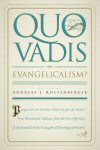
Quo Vadis, Evangelicalism?: Perspectives on the Past, Direction for the Future: Nine Presidential Addresses from the First Fifty Years of the Journal of the Evangelical Theological Society
- Author: Andreas J. Köstenberger
- Publisher: Crossway
- Publication Date: 2007
- Pages: 240
Quo vadis?-Where are you going?-is an appropriate question to ask of the current evangelical movement. To get a bearing on evangelical thought and assess future directions, the editor of the Journal of the Evangelical Theological Society, Andreas J. Köstenberger, has gathered selected addresses from past presidents of the ETS and contributed a thorough introduction and probing epilogue of his own. Covering the early years, the maturing movement, and recent times, the addresses-which span JETS’ first fifty years-include discussions of foundational doctrinal issues, exegetical and theological practice and methodology, and current concerns delivered by some of evangelicalism’s most distinguished leaders.
These presidential addresses give today’s scholars a much fuller and deeper appreciation of the history of evangelicalism and their place within it. Readers will also experience great hope for the future of a movement whose best days, by God’s grace, are yet to come.
As one of the few surviving founders and charter members of the Evangelical Theological Society, it gives me great pleasure to recommend Quo Vadis, Evangelicalism? I hope this will help others to understand our stance and help us by the grace of God to fulfill our aims, to the glory of God.
—Roger Nicole, cofounder, Evangelical Theological Society
This is a valuable history. But more than that, it shows just how difficult it is to preserve Christian orthodoxy, constantly beset as it is by questions, challenges, and perplexities. This calls for fidelity and wisdom, and these presidents showed that they had what was needed.
—David F. Wells, distinguished senior research professor, Gordon-Conwell Theological Seminary
John Stott once defined evangelicals as Bible people and gospel people. This anthology of ETS presidential addresses shows how these two lodestars-an unswerving commitment to the totally truthful Word of God written and the transforming message through the living Word of God, Jesus Christ-have guided the evangelical academy for the past half century.
—Timothy George, founding dean, Beeson Divinity School
About Andreas J. Köstenberger
Andreas J. Köstenberger is senior research professor of New Testament and director of PhD studies at Southeastern Baptist Theological Seminary in Wake Forest, North Carolina. He is the author or coauthor of several books, including Baker Exegetical Commentary on the New Testament: John, Encountering John: The Gospel in Historical, Literary, and Theological Perspective, The Missions of Jesus and the Disciples according to the Fourth Gospel, with Implications for the Fourth Gospel’s Purpose and the Mission of the Contemporary Church, and A Theology of John’s Gospel and Letters: The Word, the Christ, the Son of God. He also translated Schlatter’s New Testament Theology (2 vols.), and serves as editor of the Journal of the Evangelical Theological Society. Journal of the Evangelical Theological Society.